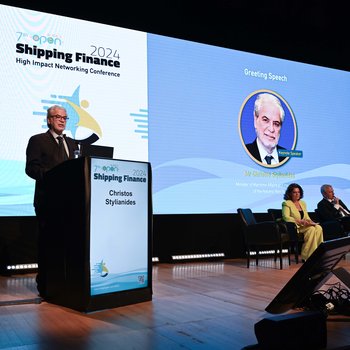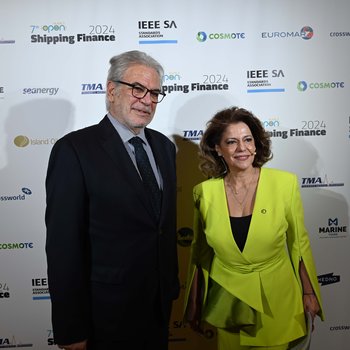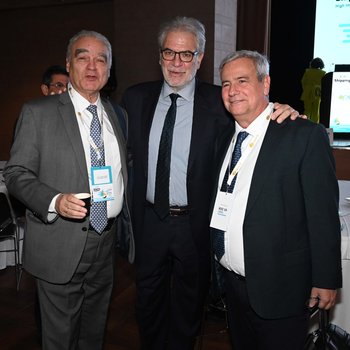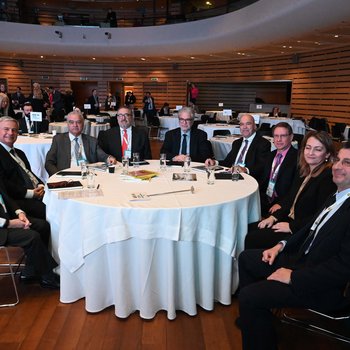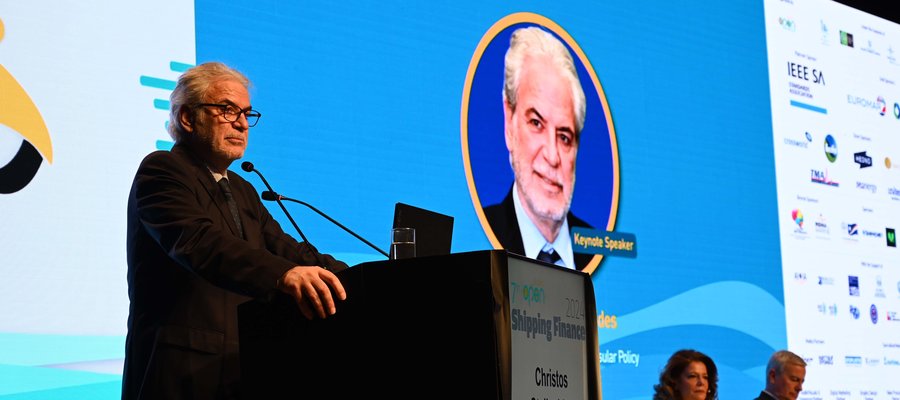
CHECK AGAINST DELIVERY
Dear IMO Ambassador in Greece and President of the Eugenides Foundation, Mr. Leonidas Eugenides,
Dear Chairman of Intercargo, Mr. Fafalios,
Distinguished Members of the Greek and the international maritime community,
Ladies and gentlemen,
I want to start by thanking the organizers, especially Mrs. Despina Travlou, for your kind invitation.
It is a great pleasure for me to address this year’s “Slide 2 Open Shipping Finance Conference” and its distinguished audience.
Today, is truly an excellent opportunity to discuss the future of shipping. “What lies ahead?”
And of course, focus on two key topics which will shape its future: Sustainability and Finance.
Two current challenges, which will impact greatly the future outlook of the shipping industry.
The shipping’s transition to the “carbon-free” era presents the sector’s greatest challenge today.
It is a radical change ahead. No doubt.
Nevertheless, we – at the Hellenic Ministry of Maritime Affairs & Insular Policy – representing the world’s largest ship owning nation – and personally me - as the Minister – believe that this challenge is also an opportunity.
An opportunity to “move forward” fast. And ensure the sustainable growth of the shipping sector.
More importantly, it is an opportunity for Greek – and the overall European shipping - to maintain or even increase its global competitiveness.
This is a particularly crucial point. Especially when we consider the current turbulent times. And that Europe, frankly speaking, is losing its overall competiveness.
As you are all well aware, the political commitment towards decarbonization in shipping is firm.
The IMO Strategy on the reduction of GHG emissions from ships is in place.
It provides the framework. And it paves the way for the transition in shipping.
From my experience in the recent IMO General Assembly – where Greece got re-elected in Category A with the majority of votes – I can say that “there is a lot of green momentum now at the IMO”.
Decarbonisation is very high on the agenda.
What we need to do now, is to clear the path in terms of implementation.
And Greece will play a leading role in that front.
We will be at the forefront throughout the whole process – in the IMO or in Brussels – towards the development of mid and long-term measures which will lead us to “carbon neutral shipping”.
We want radicalism, but we also want realism.
And we advocate for applicable and pragmatic solutions at a uniform level.
Dear friends,
The main challenge ahead is to ensure the worldwide availability of safe and affordable low and zero carbon fuels.
Without the fulfillment of this condition, our goal of decarbonizing shipping is not only uncertain but – let us be clear – it will be impossible.
We need to intensify our efforts.
And to do so, the number one priority should be Collaboration.
And in particular, Cross-Sectoral collaboration.
The issue of fuels and new technologies in shipping is a multidimensional issue.
We need to link the energy sector with the maritime value chain.
Energy producers & suppliers, port operators, logistics companies, charterers, engine manufacturers, and of course ship-owners need to collaborate.
To discuss transparently.
And of course, we need science.
We need to collaborate with the scientific community, Research Institutes & Centers to develop realistic solutions.
It is a certainly not an easy task, but we as politicians need to provide incentives, facilitate, and promote such discussions at ALL levels.
This brings me to the second issue I want to highlight – finance.
No doubt, the investments needed to decarbonize shipping are costly.
Reducing vessel source pollution and enhancing the energy efficiency, both require substantial capital.
In this respect, I believe a mix – a blend – of public and private financing needs to be examined more thoroughly.
The idea of Public-Private Partnerships suits well in this framework.
PPPs can leverage the finance needed and at the same time can also facilitate knowledge exchange and technology transfer, accelerating the deployment of innovative solutions.
They can provide the framework where finance is generated, and collaboration is promoted.
This is the direction we need to follow.
And we as politicians need to promote such “win-win” solutions.
Ladies and gentlemen,
The times are challenging.
And shipping faces a fiercely competitive international environment.
The upcoming challenges need to be seen as “opportunities”.
As Minister of Maritime Affairs & Insular Policy of Greece, I assure you that Greece will support this process by putting forward realistic solutions and applicable measures based on cross-sectoral collaboration.
Thank you once again for the kind invitation, and I wish every success to the Conference, the results of which will provide us with useful insights for our maritime future.


